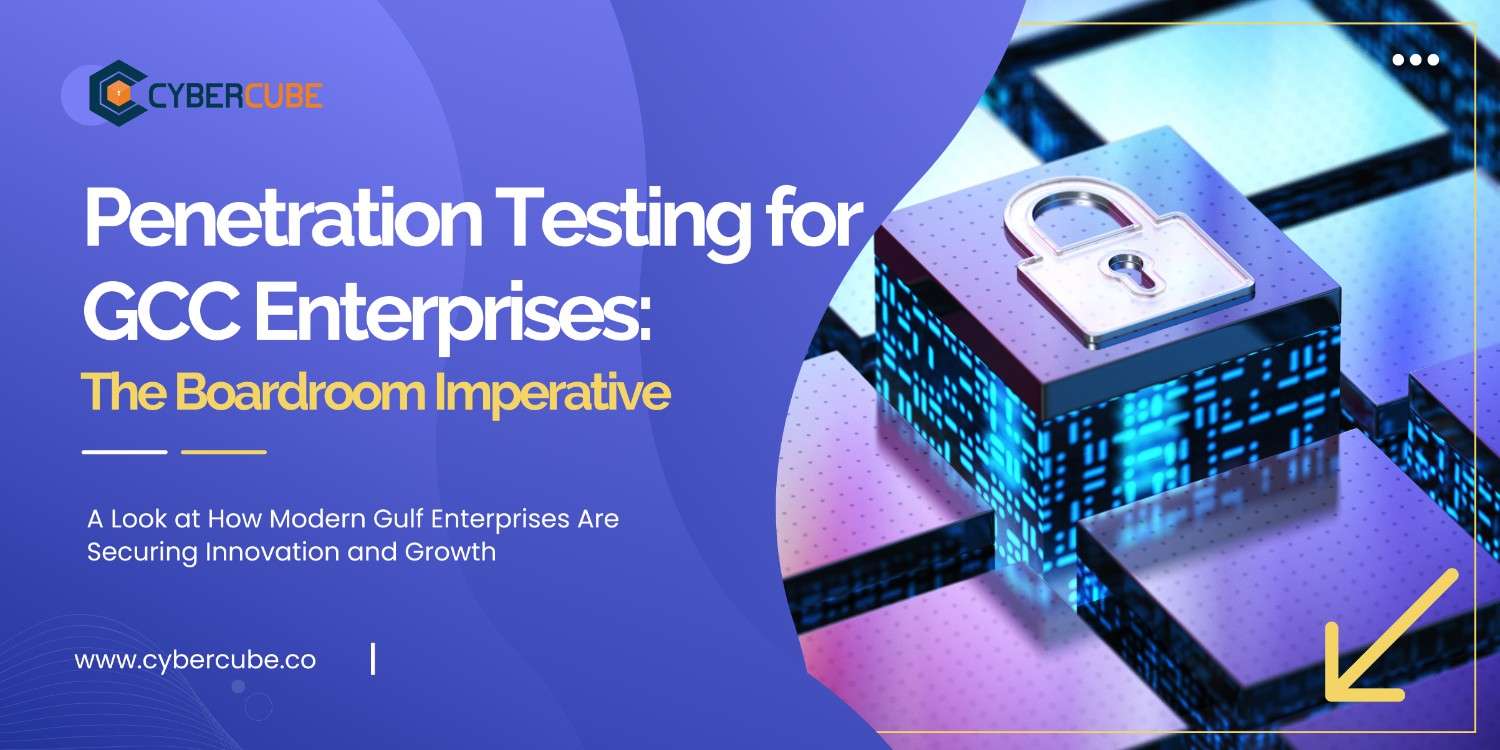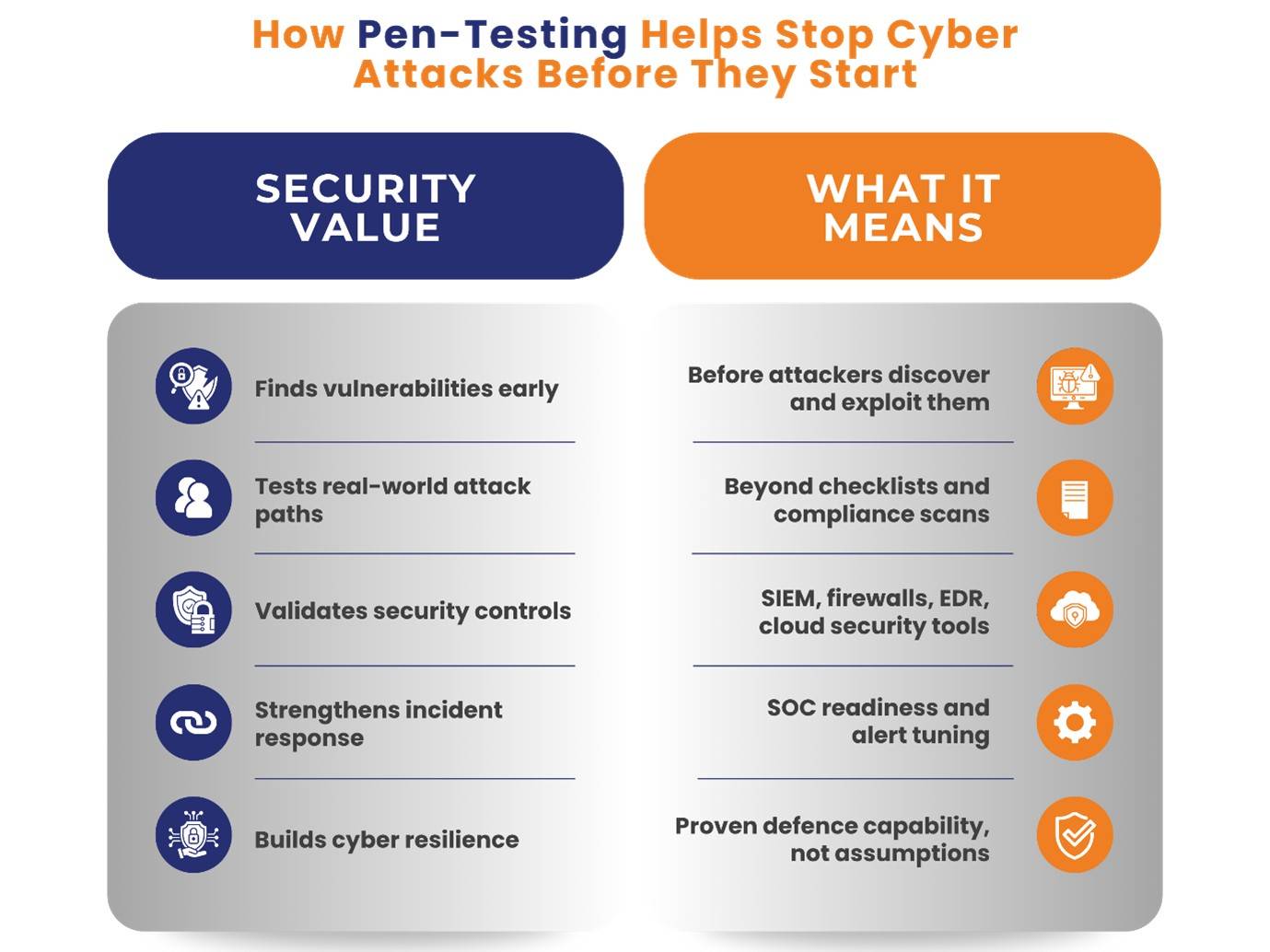
A Look at How Modern Gulf Enterprises Are Securing Innovation and Growth
The Middle East, particularly the UAE and Saudi Arabia, is emerging as one of the fastest-digitising regions globally. Smart cities, cashless economies, AI-powered services, borderless banking, hyper-connected transport and oil and gas automation, advancements are accelerating at a faster rate than almost anywhere else.
But innovation brings exposure. From targeted ransomware attacks on oil & gas systems to phishing campaigns targeting regional finance executives and supply-chain intrusions on government vendors, the threat landscape is evolving every quarter.
Recent global cyber-incidents have already shown one thing clearly: attackers no longer care about geography — they follow opportunity.
For Gulf enterprises, the question is no longer “Will we be targeted?” It’s “How prepared are we when we are?”
This is where penetration testing (Pen-Testing) becomes an urgent imperative.
What Is Penetration Testing?
Penetration testing is an organized security attack executed by cybersecurity experts to look for exploitable vulnerabilities before the real hackers find them. Essentially, it's like hiring ethical hackers to break in so the real hackers can't.
It answers the most important cybersecurity questions:
- Where are we vulnerable?
- How can someone get in?
- How quickly can they move inside our network?
- Can our security tools detect them?
- How can we close the gaps before attackers exploit them?
In 2025, pen-testing is no longer just running tools; it blends human intelligence and AI-assisted security techniques.
Why Pen-Testing is Crucial for Gulf Organisations
1. Increasing Attacks on GCC Enterprises
Reports show a surge in cyber-attacks targeting:
- Oil & Gas and Energy Sector
- Banking & Fin-Tech
- Government & Smart City Ecosystems
- Aviation & Logistics
- Healthcare & Insurance
- Large-scale Retail & E-commerce
- Hospitality & Tourism Platforms
Attackers know the region is going digital at high speed thus making it attractive and profitable to target.
Pen-testing helps organisations stay ahead by continuously identifying and fixing security gaps.
2. Business Reputation and Trust Are Everything in the Gulf
A data breach here doesn’t just cause downtime — it impacts brand credibility, investor trust, and strategic partnerships. Data leaks involving VIPs, corporate financials, or government communication have long-lasting reputational impact. Pen-testing reduces that risk dramatically by preventing initial breach vectors.
3. Complex Hybrid Environments Need Real-World Testing
Gulf enterprises operate large, hybrid, and rapidly scaling environments:
- Cloud + On-prem + OT Networks
- Smart infrastructure & IoT systems
- Operational technologies in plants and refineries
- Enterprise mobility & distributed workforce
- Multiple technology vendors and security tools
This complexity makes it impossible to rely solely on automated scanners or legacy cybersecurity processes.
Pen-testing puts your environment through real-world cyber-attack simulation, exposing weaknesses across:
| Attack Surface | Examples |
|---|---|
| Web & Mobile Apps | Banking apps, portals, digital services |
| Corporate Networks | VPNs, firewalls, AD, internal hosts |
| Cloud | Misconfigurations, IAM gaps, exposed assets |
| OT/IoT | Smart devices, sensors, industrial networks |
| Social Engineering | Spear phishing, voice-engineering |
| Third-party & Supply-Chain | Vendor access, exposed credentials |
Attackers don’t stick to boundaries — neither should your security testing.

Pen-testing shifts security from reactive firefighting to proactive resilience.
Types of Penetration Testing Gulf Enterprises Need
- External & Internal Network Pen-Testing: Simulates outsider and insider attacks to find entry paths, lateral movement, privilege escalation and data access gaps.
- Web & Mobile Application Testing: Critical for banks, fintech’s, government portals, and digital services.
- Cloud Pen-Testing: Focuses on identity misconfigurations, exposed workloads, data leakage and cloud attack vectors.
- OT & IoT Pen-Testing: Especially for oil & gas, aviation, and smart infrastructure — protecting physical systems from cyber disruption.
- Red Team & Adversary Simulation: Real-world attacker emulation using MITRE ATT&CK, social engineering, stealth and persistence.
AI is Changing Attacker Behaviour and Pen-Testing Must Evolve
Traditional cyber-attacks relied on time and manual effort. Now, attackers use automation and AI for:
- Automated vulnerability exploitation
- Ultra-personalised phishing with regional language cues
- AI-based lateral movement and evasion
- Cloud abuse scripts
- Voice-phishing targeting executives
Modern pen-testing incorporates adversarial AI simulation to keep defence ahead.
When Should Gulf Enterprises Conduct Pen-Testing?
| Event | Why It Matters |
|---|---|
| Before launching a digital service | Avoid data exposure & financial fraud |
| Before/after cloud migration | Cloud misconfigurations are major breach causes |
| Annually or bi-annually | Risk continuously evolves |
| After major infrastructure upgrade | Avoid new vulnerabilities |
| After a suspicious incident | Validate if attackers left backdoors |
| Before mergers/acquisitions | Protect digital due-diligence data |
Pen-Testing vs Automated Scanning: There’s No Comparison
| Automated Scanners | Pen-Testing |
|---|---|
| Surface-level findings | Business-impact validated exploits |
| Misses logic flaws & chained attacks | Detects real attack paths |
| No human judgement | Ethical hacking + AI + attacker mindset |
| Generic output | Actionable roadmap for security teams |
Penetration Testing is No Longer Optional
Cyber-attacks are faster, more covert and AI-driven today. Gulf organisations occupy the convergence of innovation, global interest and cyber risk. Pen-testing provides enterprises with the ability to:
- Identify vulnerabilities before attackers do
- Improve SOC readiness and detection accuracy
- Strengthen digital trust, brand credibility and customer confidence
- Build long-term cyber resilience
Cybersecurity isn’t about fear; it’s about confidence in your defence capability. Enterprises that continuously test, validate and strengthen their security posture are the ones that lead securely in the modern digital economy.
Empower Your GCC Enterprise with CyberCube
CyberCube delivers CREST-aligned, AI-assisted penetration testing and red-team assessments to strengthen your enterprise resilience and digital trust.
Schedule Your Assessment